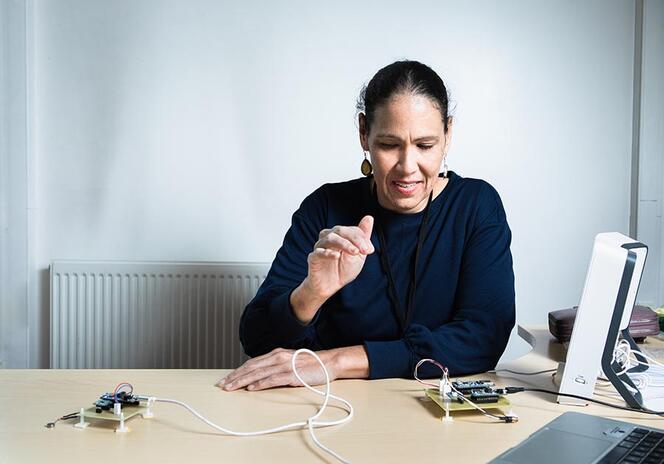This time, our series highlighting Physicists from underrepresented groups is expanding to contemporary Physicists who have studied or worked in Scotland. Today we are discussing the astrophysicist and accessibility pioneer Wanda Díaz-Merced.
For a long time, there has been perceived to be one ‘proper’ way to study astronomy. The area has been dominated by Western European scientists, despite cultures around the globe developing advanced and separate understandings of the cosmos. It is through trailblazers like Wanda Díaz-Merced that this idea has been challenged, developing a new way of understanding our cosmos.
Díaz-Merced, a native of Puerto Rico, lost her vision in her teenage years due to a degenerative eye condition. After having to give up on her dream of studying medicine, she contemplated quitting studies entirely. However, while studying in Puerto Rico, one of her classmates introduced her to the NASA project ‘Radio Jove’, which analyses radio transmissions across the galaxy. After learning as much about the program as she could, Díaz Merced travelled to the US to work on a program called xSonify, which translates signals from astronomical objects into audio recordings.
She was able to embrace the unique perspective this gave her by developing a method that converts different astronomical data into sound-sonification. By using her ears to detect patterns in stellar radio data, she was able to glean information that could be obscured by visual and graphical representations. Díaz Merced completed her PhD at the University of Glasgow in 2013 entitled “Sound for the exploration of space physics data”. By decomposing the data into frequency, oscillatory modes, and other components, she was able to test whether these sounds were effective adjuncts to existing data visualisation methods. The thesis found that, when synchronised to visual and graphical data, it helped space scientists identify events masked by noise in the 2D (visual and graphical) data. This work led to interest and recognition from the BBC – she has been included in their list of the 7 most trailblazing women in science.
Díaz Merced has now worked at various observatories across the world on her method of sonification, applying it to the solar wind, coronal mass ejections, cosmic rays, and the coalescence of black holes. Throughout her career she has advocated for increased Equity, Diversity, and Inclusion – she delivered a TED talk about the importance of an inclusive scientific community, which you can watch here. She is committed to widening access to astrophysical knowledge and tackling the barriers faced by people with disabilities when studying science.
The musician and researcher Gerhard Sonnert was inspired by Díaz-Merced to create an album based on the audio from her sonification data. You can find music here.
Díaz-Merced was able to use her disability for ground breaking research which challenges our preconceptions about who can advance the field of astronomy. Her work exemplifies that, by remaining open to all approaches and abilities, and astronomers can gain a deeper and broader understanding of the universe.
Image copyright: © Frédérique Plas
(Copyright: © Frédérique Plas)
(Copyright: © Frédérique Plas)



